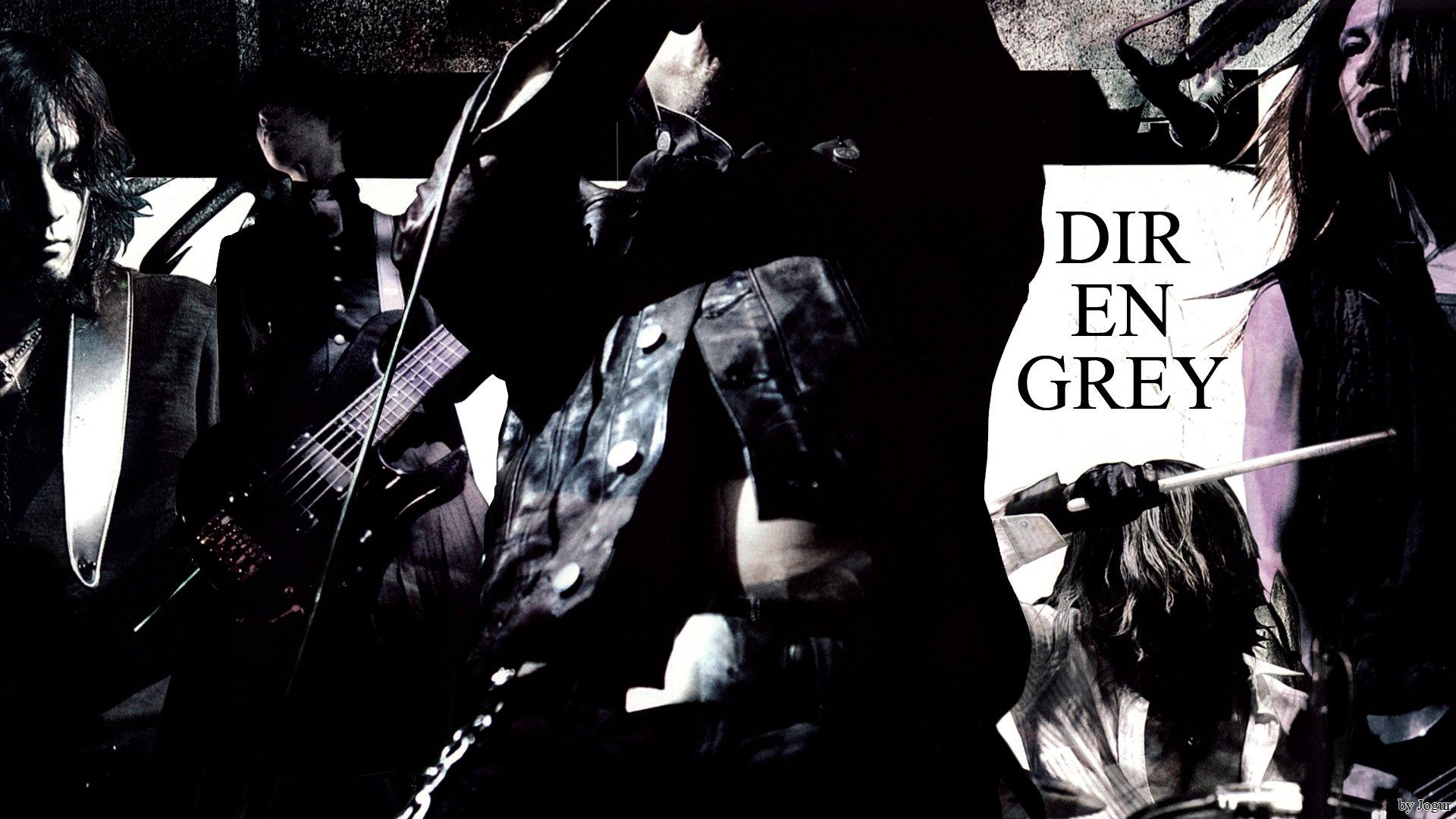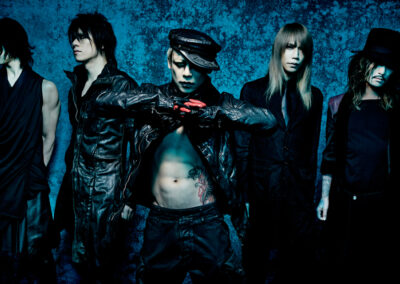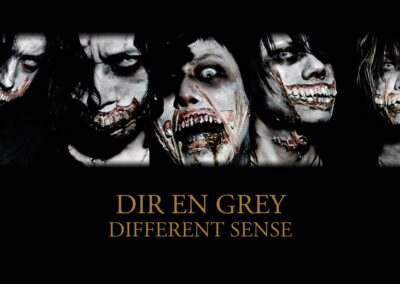From melody to mastery: Kaoru’s exploration of DIR EN GREY’s creative phase, synergy with string-brother Die, navigating musical challenges and freedom of expression
After the remarkable success of their previous masterpieces, “Uroboros”, “DUM SPIRO SPERO” and “Arche”, DIR EN GREY has undeniably set the bar incredibly high. With each release, the band continues to surpass expectations, showcasing their awe-inspiring musicianship and musical prowess. Their talent as musicians is unparalleled and their ability to craft distinct vision is truly captivating. Today, we are happy to interview the guitarist/composer, Kaoru and discuss about the band’s vision and future.
—— Arche was released almost a year ago. Do you feel like the band has entered a new creative phase?
Kaoru: Each album represents the band musically and visually as it is at the time of its release. Our latest work, Arche, was released in December of last year (2014). It will soon celebrate its first anniversary. A year is a short period of time, and long period of time at the same time. It’s short enough for us to still feel connected to this album and its universe, but also long enough to already feel in a new creative phase. I believe that at the moment, we are somewhere in between. We are constantly evolving, nothing is ever set in stone. DIR EN GREY is a band in perpetual motion. We already have new ideas in mind, ideas for composition and visual concepts (smiles).
——I see.
Let’s continue on the theme of evolution. After playing the album repeatedly throughout the year, the songs have undergone some modifications. Do these changes come to you naturally, based on your current state of mind, or do you meticulously work on them beforehand? Is it an eternal dissatisfaction on your part regarding your recorded work?
Kaoru: We do indeed make some modifications to certain songs, not all of them, for the live performances. These modifications are never major, and the altered parts are always done on very short passages. Generally, the ideas come to us while playing the songs in concert. It is the experience of being on stage that inspires us. By repeatedly playing our songs as they were written and recorded, we become aware that some of them could be better showcased live. The ideas come naturally, meaning we never force ourselves to modify our work just for the sake of it. However, the changes made are still carefully worked on, discussed, and decided upon prior to the live performances. It is not about eternal dissatisfaction with our recorded work; we simply believe that certain songs need some alterations to have a greater impact on stage. The changes are made solely to enhance the live performance, and only the live performance.
—— As for these changes, how do you work together with Die?
Kaoru: When it comes to reworking these tracks, Die and I have a clear division of roles in the studio. Typically, each of us brings his own ideas for the parts he plays. However, during rehearsals prior to a live performance, we often engage in giving advice and suggestions to one another. It’s not uncommon for me to say to Die, “Perhaps it would be better if you played this particular part, or if we approached this section in a different way.” We engage in discussions, play through the songs, exchange ideas, and continue to refine our approach. Throughout this process, we never feel like we’re compromising; we always remain aligned on the same artistic wavelength.
—— In the studio, how does your way of working differ?
Kaoru: In the studio, the roles are more defined, although there are no established rules. DIR EN GREY is a very open and completely free group. With Die, we work together and separately. We do both. There is no typical formula for composition. Sometimes we write individually and then bring our ideas together, layering our compositions on top of each other. Other times, we work side by side to see what works best together. Apologies for the inconvenience. That’s how we composed “Arche”: we wrote some melodies together, collaborating, while we wrote other melodies separately, and then, we juxtaposed our ideas. This approach works exceptionally well because each of us experiences moments of creative block, lack of inspiration, and frustration at different times. However, one person’s idea often becomes a source of inspiration for the others. We truly complement each other, freely exchanging ideas and suggestions. Whether it’s giving input to Kyo or Toshiya, there is no bickering… well, almost none (laughs).
—— The studio allows you to give free rein to your imagination. In your songs, there are many overlapping riffs and melodies. Can you explain the difficulty of trying to reproduce that on stage? How do you strive to get as close as possible to the recorded version? On stage, are you trying to be faithful to the recorded music?
Kaoru: Well… It depends on the songs, specifically the musical phrases within the songs. Generally, we gauge the atmosphere that emanates from the songs during rehearsals. This results in two types: on one hand, there are the songs that we try to reproduce identically to the recorded version because they work well live without any modifications. On the other hand, there are songs that don’t work as well, and for those, we try to deviate from the recorded version because we believe they sound better live with the changes we make to them. It is true that it is difficult to bring out the richness of a song on stage, whatever it is. All guitar riffs are played entirely by Die and myself. I don’t really want to use recorded guitar tapes to help us, although we sometimes discuss the matter. Sometimes we wonder if it might not be better to insert certain sounds by computer. But we never do it for the guitar parts, we sometimes do it for ambient sounds, only ambient sounds. Ultimately, our goal is to deliver a powerful and captivating performance that captures the essence of the recorded music while also showcasing the unique energy and atmosphere of a live show.
—— How would you differentiate your style from that of Die?
Kaoru: I don’t really see any notable differences in our playing styles (pauses to reflect). Actually, what sets us apart is what I admire most about his playing. Our touches are distinct, with Die possessing a more refined and confident touch. He also excels at playing beautiful arpeggios and composing magnificent melodies. These aspects truly differentiate us. As for my own style, it’s difficult to describe. It’s not that I lack the words, but rather I struggle to identify a specific style. Returning to Die, I find his touch to be incredibly precise, his playing decisive and straightforward. He possesses a deep understanding of the instrument, leaving no secrets within the strings.
—— Aren’t you underestimating yourself?
What are the advantages and disadvantages of being a guitarist in a two-guitar band? Do you find it intriguing because it allows you to expand your musical horizons, or do you find it limiting because you always have to consider another person’s presence?
Kaoru: As someone who has only been in two-guitar bands, the idea of being in a four-member band with just one guitarist feels strange to me. It almost seems impossible. It would create quite an uncomfortable situation (laughs). Having two guitarists is definitely an advantage, but for me, it’s just the norm. It’s not a disadvantage at all; in fact, it’s quite the opposite. Especially since we are in complete artistic harmony.
—— You will be hosting a show called The Freedom of Expression regularly starting from October 3, 2015. What do you expect from this experience? Is there a specific topic you would be interested in discussing?
Kaoru: It is a radio show about free expression. We will discuss everything that is happening here in Japan. Some topics are already planned, while others are not yet decided. The topics will evolve throughout the show. In any case, we will not only talk about music. The concept came from me, although I was inspired by someone I know who already does this. I approached the boss of a radio station where one of my former classmates worked, that’s how I got to know him! I took the opportunity to start this project. At first, I thought I would only talk about music: bands, artists, musicians. But, I don’t want to be limited to that. I will present the show in a free manner, where topics will mix and evolve, much like it naturally happens in a conversation around a table. One idea leading to another.
—— You will release your first book on October 21, 2015 (exclusively sold at Tower Records). Can you tell us more about it? Is it an autobiography?
Kaoru: I have been working on this project for three years, but it has been a collaborative effort. It can be considered a semi-biography as it follows the chronological events of my life, starting from my birth and ending with the person I have become. However, we have chosen to omit any personal dramas, accidents, or other highly personal matters. The book offers a lighthearted perspective on my life, but it is not a comprehensive account. Rather, it is a partial autobiography that incorporates information gathered from sources like Ongaku to Hito (音楽と人) magazine, where I have been writing a column for several years. The book also features an interview that delves into my childhood and includes previously unpublished photos. Throughout its pages, I share my thoughts, emotions, and perspectives on music and life. To truly grasp the atmosphere of the book, I encourage you to read it.
—— What is the meaning behind the title “Doku Gen”?
Kaoru: Doku Gen is a book that I co-wrote as a musician. Let me show you the kanji characters on the cover. The first kanji, 読 (doku), translates to “read”, while the second kanji, 弦 (gen), means “string”. The title encapsulates the concept of “reading my life, reading the life of a musician, the life of a guitarist” in a simple and straightforward manner (smiles).
—— It’s interesting because without the clarification of the kanji characters that I hadn’t seen, I thought ‘Doku Gen’ meant “talking to oneself”. Will there be an English edition?
Kaoru: No, there are no plans for an English edition (grimaces).
—— Back in 2008, during the Uroboros era, I asked you if you would ever embark on side projects. You responded that you would do so when the timing was appropriate. Now, seeing that all of you have launched your individual endeavors (such as your clothing collection distributed by MOISES, your book “Doku Gen”, sukekiko for Kyo, DECAYS for Die, and 100% Natural Dirty for Toshiya) almost simultaneously, could you shed some light on what made the past two years so conducive to these ventures?
Kaoru: Actually, we had been thinking about it for quite some time. In 2008, the circumstances weren’t quite right, there was something holding us back, but the idea was always lingering. Kyo had the courage to take the plunge first, and the rest of us naturally followed suit without any hesitation.
[ Editor’s note: | Interview 2008]
—— You are about to embark on a tour in America and play two consecutive dates at the Nippon Budokan in February. Finishing a long world tour at the Nippon Budokan is like putting the final punctuation mark on an album era. What does the Nippon Budokan mean to you?
Kaoru: One of the main reasons is actually the venue’s size, which we find ideal. Additionally, we have a special affinity for performing there. Other venues somehow don’t evoke the same sentiment within us. While another venue could have sufficed, the Budokan offers the perfect space to create a grand spectacle, surpassing our usual performances. It’s not necessarily the definitive marker of the end of an album, but we genuinely appreciate the Budokan as a venue, I believe.
—— Yesterday, I noticed you had a bandage on your hand. I believe it was also the case in Paris. How are you doing?
Kaoru: Hmm… (looks at his hand, with a somber expression). Lately, I’ve been experiencing pain in my hand, and it’s been getting worse. I don’t think it’s going to get better. It seems to be a fracture. I’m working on my recovery, being cautious with my activities, and I’ve been going to the hospital for regular check-ups (moves his fingers on his hand). But overall, I’m hanging in there, or at least I hope so. It’s the result of years of playing, the intensity of my style, and the rhythms have changed quite a bit over time… I gradually started to realize that the pain was becoming unusual. I’m afraid it will gradually worsen…
—— Oh, I had no idea. I’m at a loss for words… I wish you a speedy recovery and urge you to take care of yourself. Good luck for tonight.
Kaoru: Thank you, it’s not going to be easy.
__________________
Mandah FRÉNOT
(c) VMJ




